|
We'd have loved to present you with
20 surprises, but that would have meant leaving out several of India
Inc.'s usual suspects who are so evidently global plays, and good
global plays at that. So, 12 of the 20 belong to sectors where India
has already acquired some brand equity globally: pharmaceuticals,
biotech, software, and it-enabled services. The real lesson, though,
lies in the other eight. They belong to sectors as varied as paints,
cement, packaging, banking, motorcycles, non-ferrous metals, oil,
and petrochemicals. That proves what some India-watchers have maintained
all along: across sectors, India Inc. has the potential to succeed
in the global arena. We'd like to think so.
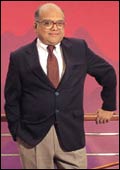 |
| Asian Paints's Dani: The world is now
his canvas |
ASIAN PAINTS/Ashwin Dani
A Brighter Shade Of Brand
With manufacturing facilities across
24 countries, Asian Paints is already a global paints major.
Truth be told, Asian Paints is among
the 10 largest decorative paints companies in the world, it has
a total installed capacity of 330 million litres a year, and it
will close this year with revenues around Rs 1,750 crore. It owes
much of this to recent acquisitions: of Singapore's Berger International
and Egypt's SCIB Chemical SAE, but that isn't the only reason why
Asian Paints figures here. Over the years, the company has built
its success around superior supply chain management-it is one of
India's most wired companies and services 14,500 dealers directly-and
consumer product style branding. "Capacity isn't important
in the paint industry," explains Managing Director Ashwin Dani,
who copes with the increasing demands of his job with a little help
from yoga. "What's important is distribution, efficient manufacturing
and R&D, and brands."
-Dipayan Baishya
AVESTHA GENGRAINE TECHNOLOGIES/Villoo Morawala Patell
Ever-Fresh Tomatoes, Anyone?
Simple, basic research may help Avestha
Gengraine strike it rich.
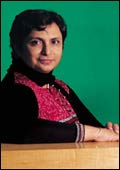 |
| Avestha Gengraine's Patell: No reverse
engineering for this lady, please |
Know why basmati has a unique aroma?
Bangalore-based Avestha Gengraine's founder-CEO Dr Patell does;
she's even identified the genes responsible. That's just a sample
of the work Avestha does: the company is a powerhouse-in-the-making
in domains such as genomics, proteomics, nutraceuticals, and bioinformatics.
The two-year old start-up (2002-03 revenue estimates: Rs 3 crore)
that is putting its skills to discoveries such as drought resistant
crops and drugs targeting diabetes and tuberculosis has attracted
investors like the Tata Group and ICICI Ventures, but needs between
$12 million (Rs 57.6 crore) and $15 million (Rs 72 crore) to ramp
up research. Contract research for the likes of Astra Zeneca, Adventa,
and Torrent helps, but Patell is miffed that some venture capitalists
do not understand the business. "A lot of biotech work being
done in India is reverse engineering," she says. "We are
the only company doing fundamental research."
-Venkatesha Babu
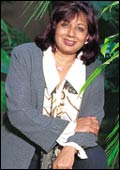 |
| Biocon's Shaw: She's fermented a success-enzyme |
BIOCON/Kiran Mazumdar Shaw
Biotech's Very Own Infosys
Biocon's future may well be the future
of the Indian biotech industry.
While flattering, any comparison of
Biocon with Infosys would be inaccurate. The former is older. That
its turnover today is a mere Rs 290 crore is an indictment of a
sector that yo-yos between hype and hope. Still, there's no company
better poised to benefit from the boom-to-be in biotech. The facts:
Biocon already is the global leader in select market segments (such
as the enzymes that keep fresh juices, well, fresh), has contract
and clinical research arms, and boasts some 40 patents to its name.
By 2010, claims its chairperson and managing director Kiran Mazumdar
Shaw, Biocon would have developed three novel drug molecules and
be among the world's 10 largest biopharmaceutical companies; by
2005, she aims to be the world's largest producer of human insulin
and statin. That requires money; early next year, Biocon could raise
around Rs 200 crore through an IPO. "The momentum is with us
and we will emerge global players in all segments of biotech,"
says Shaw.
-Venkatesha Babu
 |
| Cipla's Hamied: His strategy is a unique
formulation |
CIPLA/Y.K. Hamied
The Complete Pharma Company
Cipla has evolved a low-risk global business
strategy.
The world may have gotten to know
Cipla when the company offered its triple regimen anti-aids drugs
to the South African government at a fraction what the patent-holders-GlaxoSmithkline,
BMC, Pfizer and Boehringer Ingelheim-were asking, but Cipla has
been a global player for some time, albeit in its own unique way.
Its formulations are largely marketed locally and bulk drugs are
exported-exports account for 35 per cent of its revenues (Rs 1,275
crore in 2001-02) and the company is present in 130 countries. Cipla
boasts strategic alliances with leading generic companies (those
that make a good living out of manufacturing drugs that go off patent)
in the US and Europe, a strategy that enhances reach and reduces
litigation-risk, something generics companies have to live with.
And Chairman Y.K. Hamied ensures that some of the company's revenues-4
per cent actually-goes into R&D. One output of such research,
a cfc-free budesonide inhaler has a huge market abroad.
-Shilpa Nayak
 |
| Daksh's Aggarwal: Look ma, low-cost scalability |
DAKSH/Sanjeev Aggarwal
Exploring Amazon
With an impressive client-list, Daksh
may well be Indian BPO's Cinderella.
If Daksh stands out in India's Business
Process Outsourcing clutter, attribute that to its business model:
create infrastructure, get clients, deliver the service, make a
profit, expand, repeat ad infinitum. From a 30-seat facility, Daksh
has grown to a 1700-seat full-fledged BPO company handling voice-based
transactions for companies like Amazon, Yahoo, and Hewlett Packard.
That, and hard numbers-it could close this year with $35 million
(Rs 168.2 crore) in revenues-have kept venture capitalists' interest
up: Citibank and General Atlantic Partners put in $ 21 million recently.
Some of that will go into a 1000-seat centre. The competition in
the BPO space got tougher in 2002 with Infosys, Wipro, and Satyam
making concerted plays, but that doesn't faze founder-CEO Sanjeev
Aggarwal. "With a sound business model, a strong knowledge
foundation, and a high level of discipline, we are poised for stupendous
growth."
-Abha Bakaya
 |
| Dr Reddy's Dr Reddy: Science will show
the way |
DR REDDY'S/Dr K. Anji Reddy
A Pure Innovation Play
Dr Reddy's wants to be a global discovery-led
pharma company by 2012. It may make it.
The bottle of champagne he uncorked
at 3.00 a.m. on December 18 is displayed in CEO G.V. Prasad's office.
That was the day a New Jersey court ruled in favour of Dr. Reddy's
in a patent dispute with Pfizer, clearing the way for the launch
of the first of its speciality products in the US. Starting now,
the company hopes to create a pipeline of such products in the next
five-to-seven years, becoming, first, a global midsized player and,
three to five years thence, a discovery led pharma company. The
numerical target: revenues of over $1 billion (Rs 4,808 crore) by
2007, up from $340 million (Rs 1,739 crore) in 2001-02. With 10
molecules in its pipeline there's no reason the company can't do
it. "In five to seven years," says Chairman K. Anji Reddy,
"we would have completely transformed ourselves to a company
powered by drug discovery and innovation."
-E. Kumar Sharma
 |
| Gujarat Ambuja's Sekhsaria: He has cost
on his side |
GUJARAT AMBUJA/N. Sekhsaria
The Cement Czar Cometh
Cement is largely a local business, but
Gujarat Ambuja could get as global as it wants.
Fine, Gujarat Ambuja is the lowest
cost producer of cement in the world and it boasts higher operating
margins than global cement majors, 36 per cent in 2001 (on revenues
of Rs 1,448 crore) as compared to Lafarge's 21 per cent and Holcim's
24 per cent. Surely, that isn't reason to celebrate it as a global
probable, not when 90 million tonnes of the 112 million tonnes of
cement produced in India is consumed within its borders. Well, fact
is Gujarat Ambuja has a presence in Sri Lanka, through Ceylon Ambuja,
a wholly-owned subsidiary, and it accounts for 45 per cent of India's
cement exports. "Exports are remunerative because of our low
cost, and transportation infrastructure," says Anil Singhvi,
a whole-time director of Gujarat Ambuja. "It could be Maldives
next. And if the pricing is right, we may go to Europe."
-Roshni Jayakar
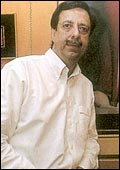 |
| Essel Propack's Bagwadia: It's a big
squeeze really |
ESSEL PROPACK/Cyrus Bagwadia
Toobin' The World
By 2005, claims Essel Propack, it will
make every second laminated tube in the world.
The Subhash Chandra-promoted Essel
Propack is in the enviable position of not having to become a global
company: it is already one. With estimated revenues of $120 million
(Rs 600 crore) in 2002-03 (63 per cent will come from overseas operations),
it is the world's largest laminated tube (lamitude for short) manufacturer,
has a manufacturing presence in 11 countries including China, a
global market share of 25 per cent, and caters to all of p&g's
lamitube requirements in the US, and 40 per cent of Unilever's.
By expanding its capacity to 7 billion tubes a year eventually,
acquiring companies abroad, and venturing into hitherto untapped
product market segments such as cosmetics and pharmaceuticals, Managing
Director Cyrus Bagwadia, hopes to make every second lamitube in
the world by 2005. "Given our aggressive plans for growth"
says CFO R. Chandrashekhar, "all current processes are being
challenged."
-Dipayan Baishya
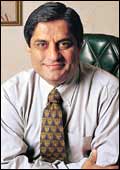 |
| HDFC Bank's Puri: He's wired it all up |
HDFC BANK/Aditya Puri
India's Most Intelligent Bank
HDFC Bank needs to muster capital to go global;
it has all else that is required already.
Facts tell the story: 211 branches,
deposits of Rs 19,606 crore, non-performing assets that constitute
0.5 per cent of total advances, #2 in the BT-KPMG Best Banks survey,
and rated best commercial bank in India in 2002 by Asiamoney. Behind
HDFC Bank's success lies its ability to provide a range of products
through multiple channels, and differentiate itself through the
use of technology. By 2003-04, reckons CEO Aditya Puri, the bank
will be a leader in all segments except credit cards. "In 2001,
we invested in intelligent market infrastructure and picked up equity
capital," says Puri. "Now we are sitting pretty."
-Roshni Jayakar
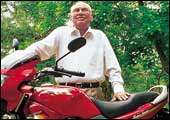 |
| Hero Honda's Munjal: Two stroke good,
four stroke better |
HERO HONDA/B.M. Munjal
Wheels, Wheels, Wheels
Hero Honda is already the world's largest
producer of motorcycles. What next?
Intense competitive activity may have
whittled down Hero Honda's marketshare from 48.8 per cent in 2001-02
to 45.8 per cent thus far this year, but the performance of the
company, in terms absolute and relative, remains nothing short of
the spectacular. The company that Brij Mohanlal Munjal chairs will
end 2002-03 with Rs 5,901.3 crore in sales. That'll mean a 30 per
cent growth over the record 1.4 million units it sold last year.
Concern over the fact that Honda will launch bikes through a 100
per cent subsidiary next year continue, but Hero Honda may well
be one company that could find global success in India. "We
rely on Honda for core technology," admits CEO Pawan Munjal,
"but we have no lack of funds as far as R&D is concerned."
-Abha Bakaya
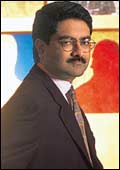 |
| Hindalco's Birla: Watch out for him in
Fortune's Global 500 listing |
HINDALCO/Kumar Mangalam Birla
The Non-Iron General
Hindalco may have a global non-ferrous
future.
True, with sales of Rs 2,659 crore
in 2001-02, Hindalco is nowhere close to the Fortune 500-#500, Takenaka
boasts sales in excess of Rs 48,000 crore. Even its three-year sales
target-Rs 18,000 crore-won't qualify the company for the honour.
Still, Hindalco remains one of the largest integrated plays in aluminium
and among the lowest cost producers too. The intra-group restructuring
that saw it acquire the copper business of Indo Gulf Corporation
will help it balance revenues-both are cyclical businesses and their
fortunes alternate. "Our strategy is to focus on global cost
competitiveness," says A.K. Agarwala, Director, Hindalco. "We
will pursue value added growth both organically and inorganically
and not remain a mere metal supplier." Already, Hindalco is
scouting for overseas acquisitions. As we said, Chairman Kumar Mangalam
Birla could make it to the Fortune 500 listing sooner than we think.
-Roshni Jayakar
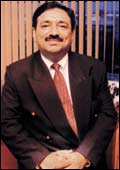 |
| iFlex's Hukku: He wants Flexcube at #1 |
I-FLEX/ Rajesh Hukku
Software's Tom Cruise
Simple, i-flex is India's largest software
products company.
The numbers prove i-flex's global
nature: its product Flexcube has been accepted by 370 corporate
customers across 86 countries. But that isn't the only reason the
Citibank spin-off-it boasted a turnover of Rs 425 crore in 2001-02-figures
here. It does because of mi3. "The first Mission Impossible
was to prove Indian could successfully make a software product,"
laughs Hukku. "The second was to make our offering a global
product, and now mi3 is dedicated to making Flexcube the #1 financial
services product in the world."
-Venkatesha Babu
INFOSYS/Nandan Nilekani
Bangalore's Dignitary Trap
With employees from 34 nationalities, Infosys
is a global IT services firm.
 |
| Infosys' Nilekani: He's certainly the
man everyone wants to beat in three dimensional chess |
Surely you've heard all there is to
know about Infosys, India's best known it services company? From
a turnover of Rs 5 crore and employee strength of 200 in 1991, the
Bangalore-based software company will end this fiscal with a turnover
of around Rs 3,400 crore and an employee strength of approximately
13,000. And oh yes, India's National Association of Software and
Service Companies recently named Infosys the most profitable software
company in the world (specifics: its operating margin of 32.1 per
cent clearly beats those of EDs, Cognizant, and Accenture), not
just India.
Still, as CEO Nandan Nilekani, who likens the whole thing to a
3d chess game puts it, "In an era when it spending is flat,
growth can come only by taking market share from others." That
Infosys is well placed to do: it is present across the IT services
spectrum, from Business Process Outsourcing to high-end information
technology consulting.
Building on its success won't be easy for Infosys. It has to scale
up its high-end business without losing any of the values that have
made it unique; it has to look for inorganic opportunities for growth;
and it has to learn to manage a global workforce. "We are bringing
a compelling value proposition to the table," says Nilekani.
"Technology, not for its own sake, but in terms of how it can
translate into profits for customers."
-Venkatesha Babu
 |
| Moser Baer's Puri: He'd love to CD-R
the world |
MOSER BAER/Deepak Puri
The Data Storage Don
Moser Baer's 5 per cent share in the
global data storage business can only increase.
In the early 1980s Moser Baer started
life as a company making diskettes. But it was only when it entered
the optical recording media business that it hit big time. Today,
Moser Baer may well be the only alternative to a clutch of Taiwanese
companies for customers looking for compact discs (CDs), recordable
compact discs (CD-RS) and digital versatile disks (DVDs). With sales
of Rs 724 crore in 2001-02-almost a 100 per cent jump over the previous
year-and a obsolescence-proof alliance with the US' 4m technologies
for joint development and implementation of new optical media processes
and formats, the company is sitting pretty. "We will use cutting
edge technology to enter into formats desired by the market very
early in the product lifecycle," says CEO Deepak Puri. Recordable
DVDs, for instance, will be in the company's portfolio in the first
half of 2003.
-Shilpa Nayak
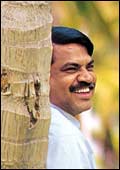 |
| Kshema's Koppar: He's done healthcare
and embedded services; now he wants to be a consultant too |
KSHEMA TECHNOLOGIES/Anant Koppar
Mid-sized, and loving it
India's first venture capital funded
software company is alive and well.
Small software companies were expected
to roll over and play dead this year. Try telling that to Bangalore-based
Kshema Technologies. By focusing on select domains-think industrial
automation, embedded electronics-the Rs 68-crore company has weathered
the IT winter rather well. It was one of the first companies to
enter the new business of bio-informatics, and it now wants to be
a consulting firm. By 2005, claims CEO Anant Koppar, the company's
revenues would have touched $100 million (Rs 480 crore). ''Why only
take on other Indian it majors?,'' says Koppar. ''We are ready for
the Accentures and the IBMs of the world.''
-Venkatesha Babu
ONGC/Subir Raha
Finding Black Gold Abroad
ONGC's strategy of acquiring interests
in oil fields abroad is beginning to pay off.
 |
| ONGC's Raha: Now he can sit back and
smile |
Finally, the Rs 17,264 crore Oil and
Natural Gas Corporation may have an answer for detractors who chorus,
"What happens when Bombay High runs dry?"
On December 18, its wholly-owned subsidiary ONGC Videsh piped
out the first gas from the Lay Tau and Lan Do fields in Vietnam-it
has a 45 per cent stake in the venture. That's important for a company
that has set itself the strategic objective of doubling its accessible
reserve to 12 billion tones by 2020:
Apart from the Vietnam fields, ONGC has invested Rs 8,330 crore
into Russia's Sakhalin project which is estimated to be sitting
on reserves of 307 million tones of crude and 485 billion cubic
feet of gas, holds a 49 per cent stake in two exploration blocks
in Libya, and has put in Rs 3,430 crore into a Sudanese field.
In an effort to insulate the business from the volatility in crude
prices, Chairman Subir Raha also wants to diversify into the more
profitable business of petroleum refining and marketing. The acquisition
of the A.V. Birla Group's 37.39 per cent stake in Mangalore Refineries
and Petrochemicals Limited is the first act of that strategy. The
market seems to have recognised that. In the first half of 2002-03,
ONGC was the most valuable company on the Bombay Stock Exchange.
-Ashish Gupta
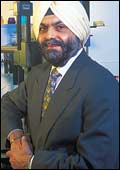 |
| Ranbaxy's D S Brar: Eyeing revenues of
$1 billion by 2004 |
RANBAXY/D.S. Brar
India's first MNC
Its US subsidiary made over Rs 1,000
crore in the first nine months of 2002. Need we say more?
It is the only Indian pharma company
with its own distribution network in the US, operations in Brazil,
the UK, Germany, Japan, South Africa, and China. More than 50 per
cent of its Rs 2,071.7 crore revenues (for the first nine months
of 2001-02) came from exports while the overseas operations accounted
for Rs 2,750 crore. And Cefuroxime Axetil, a generic drug used in
the treatment of respiratory and dermatological ailments that was
launched by the company in March 2002, has already generated some
Rs 360.6 crore in sales. But don't dismiss Ranbaxy as a generic
wonder-the company is betting big on research and boasts a clutch
of molecules in the pipeline. ''As we become a global player,"
says CEO D.S. Brar, ''there will be a focus on new drug discovery,
drug delivery systems, technology licensing, and M&As.''
-Abha Bakaya
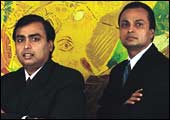 |
| Reliance's Brothers Ambani: Ambitions,
not to scale |
RIL/Mukesh D. Ambani & Anil D. Ambani
Old & New Economy Behemoth
Petrochem, petroleum, and now telecom,
Reliance is a global scale play in all.
World class is a term that comes easily
when describing the Rs 57,120 crore Reliance Industries Limited
(RIL). From petrochemicals to oil and gas, refining to petro-product
marketing, and power to telecom, the conglo has always focused on
deriving competitiveness from sheer scale. "In line with our
founder chairman's vision, and his philosophy of thinking world
scale and world class in every aspect, we are committed to the future
growth of India and Reliance," says Anil Ambani, Vice Chairman
and MD, RIL. The year that was saw RIL's entry into the Fortune
500 (it is India's only private sector company to figure there),
one of India's biggest natural gas strikes by the company, and India's
biggest and boldest telecom play by subsidiary Reliance Infocomm.
-Roshni Jayakar
 |
| Shantha Biotech's Reddy: The world is
not enough |
SHANTHA BIOTECHNICS/ K.I. Varaprasad Reddy
The 32 Per Cent Solution
Miffed by happenings in the Indian market,
the biotech hotshop is eyeing a global future.
It seems strange that the first Indian
company to indigenously produce the Hepatitis B vaccine isn't really
very keen on India. ''I am left with no urge to supply to the Indian
market,'' says Shantha Biotechnics' Managing Director K.I. Varaprasad
Reddy. ''Players can compete on unequal terms.'' So, the biotech
hotshop is eyeing the world. ''We have been investing in research
since 1992,'' says Reddy. Over the last five years, the Rs 30 crore
company has invested 32 per cent of its turnover each year in R&D.
-E.K. Sharma
WIPRO/Azim Premji
The Colours Of Growth
Wipro's global software future can only
get brighter and better with time.
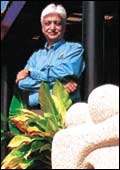 |
| Wipro's Premji: Nurturing a different
model |
From chairman Azim Premji's near-reclusive
love of the low-profile to the fact that it is really a diversified
conglo, to several more tangible differentiators, Wipro isn't like
any other software services company. For one, it still derives close
to 12 per cent of its revenue from writing software for telecom
companies. For another, the stable European market accounts for
27 per cent of its revenues, the highest for any Indian software
company. In 2002, the Rs 3,416 crore company (Wipro Technologies,
the software division accounts for 64 per cent of revenues and 85
per cent of earnings) acquired India's largest independent BPO company
Spectramind and Ericsson's development centre, bought out GE's stake
in a subsidiary that writes software for medical apps, and created
a separate division to focus on the lucrative bioinformatics and
software-for-healthcare market. "In the global race to become
dominant," says Vice Chairman Vivek Paul, "the window
of opportunity is shrinking constantly. Therefore, if the situation
demands, we have made acquisitions in the past and will do so again
in the future."
-Venkatesha Babu
|

